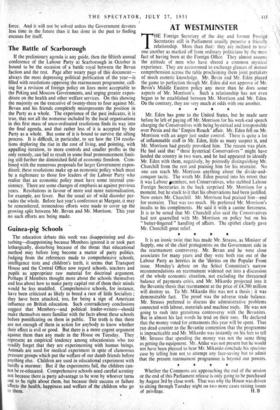AT WESTMINSTER
THE Foreign Secretary of the day and former Foreign Secretaries still in Parliament usually preserve a friendly relationship. More than that: they are inclined to teal one another as marked off from ordinary politicians by the mere fact of having been at the Foreign Office. They almost assume • the attitude of men who have shared a common mystical experience. They are accustomed to exchange glances of mutual comprehension across the table proclaiming them joint partakers of much esoteric knowledge. Mr. Bevin and Mr. Eden played the game to perfection though Mr. Eden did not approve of Mr. Bevin's Middle Eastern policy any more than he does some aspects of Mr. Morrison's. Such a relationship has not even begun to be established between Mr. Morrison and Mr. Eden. On the contrary, they are very much at odds with one another.
* * * * Mr. Eden has gone to the United States, but he made sure before he left of paying off Mr. Morrison for his week-end speech charging the Conservatives with being hysterical and irresponsible over Persia and the 'Empire Roach' affair. Mr. Eden fell on Mr. Morrison with an anger just under control. There is quite a lot of inflammable stuff in Mr. Eden, little as many suspect it, and Mr. Morrison had greatly provoked him. The reason was plain. He had said that "these hysterical Conservatives" might have landed the country in two wars, and he had appeared to identify Mr. Eden with them, negatively, by pointedly distinguishing Mr. Churchill from the rest and praising him for his restraint. No one can teach Mr. Morrison anything about the divide-and- conquer tactic. The wrath Mr. Eden poured into his retort that it was Labour aembers, not Conservatives, who stabbed Labour Foreign Secretaries in the back surprised Mr. Morrison for a moment, but he stuck to it that his observations had been justified. Now enters Mr. Churchill. Mr. Morrison had praised him—and for restraint. That was too much. He preferred Mr. Morrison's insults to his compliments. He said it with a canine fierceness. It is to be noted that Mr. Churchill also said the Conservatives had not quarrelled with Mr. Morrison on policy but on his " butter-fingered " handling of affairs. The epithet clearly gave Mr. Churchill great relief.
* * * * It is an ironic twist that has made Mr. Strauss, as Minister of Supply, one of the chief protagonists on the Government side in the rearmament controversy. Mr. Bevan and he were close associates for many years and they were both run out of the Labour Party as heretics in the 'thirties on the Popular Front issue. Monday's debate on the Select Committee's narrow recommendations on rearmament widened out into a discussion of the whole economic situation, not excluding the threatened balance of payments crisis, and Mr. Mikardo projected into it the Bevanite thesis that rearmament at the price of £.4,700 million will destroy us. To Mr. Mikardo this was not a thesis ; it was demonstrable fact. The proof was the adverse trade balance. Mr. Strauss preferred to discuss the administrative problems connected with labour, materials and machine toqls. He was not going to rush into gratuitous controversy with the Bevanites. But in almost his last words he trod on their toes. He declared that the money voted for armaments this year will be spent. That ran dead counter„to the Bevanite contention that the programme is impracticable and Mr. Mikardo was instantly on his feet to tell Mr. Strauss that spending the money was not the same thing as getting the equipment. Mr. Attlee was not present but he would not have been pleased to hear Mr. Mikardo conclude his specious case by telling him not_to attempt any face-saving but to admit that the present rearmament programme is beyond our powers.
* * * * Whether the Commons are approaching the end of the session or the end of this Parliament release is only going to be purchased ,...by August 3rd by close work. That was why the House was driven to sitting through Tuesday night on two more cases raising issues


































 Previous page
Previous page